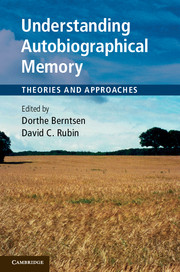Book contents
- Frontmatter
- Contents
- List of figures
- List of tables
- List of contributors
- Preface
- Acknowledgements
- 1 Introduction
- Part I Approaches to the study of autobiographical memory
- Part II Neural studies of autobiographical memory
- 6 The contribution of research on autobiographical memory to past and present theories of memory consolidation
- 7 Functional neuroimaging of autobiographical memory
- Part III Social and cultural aspects of autobiographical memory
- Part IV Development of autobiographical memory from infancy to old age
- Part V Evolution and basic processes of autobiographical memory
- Part VI Discussion
- Index
- References
6 - The contribution of research on autobiographical memory to past and present theories of memory consolidation
Published online by Cambridge University Press: 05 November 2012
- Frontmatter
- Contents
- List of figures
- List of tables
- List of contributors
- Preface
- Acknowledgements
- 1 Introduction
- Part I Approaches to the study of autobiographical memory
- Part II Neural studies of autobiographical memory
- 6 The contribution of research on autobiographical memory to past and present theories of memory consolidation
- 7 Functional neuroimaging of autobiographical memory
- Part III Social and cultural aspects of autobiographical memory
- Part IV Development of autobiographical memory from infancy to old age
- Part V Evolution and basic processes of autobiographical memory
- Part VI Discussion
- Index
- References
Summary
The past isn’t dead; it isn’t even past.
– William FaulknerHow memories are consolidated is a problem that is at the core of memory research. Without consolidation, memories are fleeting; distraction, interference, noxious agents, drugs, brain damage, or the mere passage of time will disrupt and eliminate them. Consolidation is the time and experience-dependent process by which newly acquired memories become stabilized so that they are relatively immune to disruption by all these influences. Not surprisingly, therefore, consolidation has been a topic of investigation since the beginning of the scientific study of memory. In this chapter, I will focus on the role that autobiographical memory has played in our understanding of the neural mechanisms implicated in consolidation.
The turn of the twentieth century
Autobiographical memory played a significant role in establishing that brain damage or trauma can disrupt consolidation, and continues to play this role during bedside investigations of memory loss. Patients are asked routinely if they know where they are, what brought them to this location, what they did recently, and what they remember about their more remote past, such as the schools they attended, the friends they had, the jobs they held, and so on. They also are asked questions regarding general knowledge, such as who is the current mayor or head of the country, and about news events from the recent and remote past. Based on such anecdotal evidence, investigators dating back to the end of the nineteenth century concluded that recent memories are more vulnerable to disruption than remote memories, presumably because the latter had an opportunity to become consolidated whereas the former did not (Ribot, 1882). The term “consolidation” was coined by Müller and Pilzecker (1900) to account for the results of their behavioral, laboratory-based experiments in which they measured the time it took newly learned memories to become resistant to disruption by a subsequent, to-be-remembered event. By 1904, Burnham concluded:
The fixing [consolidation] of an impression depends on a physiological process. It takes time for an impression to become so fixed that it can be reproduced after a long interval; for it to become part of the permanent store of memory considerable time may be necessary. This we may suppose is not merely a process of making a permanent impression upon the nerve cells, but also a process of association, of organization of the new impressions with the old ones.
- Type
- Chapter
- Information
- Understanding Autobiographical MemoryTheories and Approaches, pp. 91 - 113Publisher: Cambridge University PressPrint publication year: 2012
References
- 6
- Cited by



